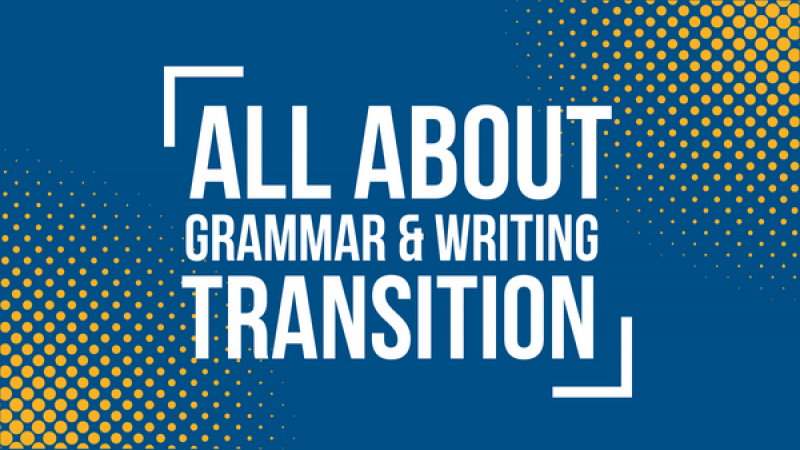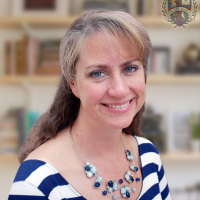All About Grammar & Writing Transition Class

Wondering what Grammer and Writing Transition and Grammar Resher course covers and if it’s right for your student? Watch this video to hear directly from Dean Laura King, VSA Teacher.
Episode Transcription
Note: This transcription may vary from the words used in the original episode for better readability.
Grammar Writing Transition is actually what you would think it would be based on the title of the course. It is a bridge or a transition for students who may be struggling a little bit with grammar or maybe have never written formal papers or maybe just are a little bit on the younger side, and they need that extra time to develop their skills, to develop their depth of knowledge in grammar before they move into a composition course.
So Grammar and Writing Transition is not just geared for brand new students, although it is very helpful for brand new students. It's not just geared for students who have had Shurley Grammar; although having Shurley Grammar is a great foundation, and now I know about CAP, I did not know that we had another course that did any sentence diagraming, which we do ad infinitum it seems like sometimes in our Grammar and Writing Transition course.
So the books that you see here on the screen are ridiculously small. So I'm going to show you something that's actually a little bit more visible. It is actually a book that's large enough to hold in your hands. So this is Our Mother Tongue. And if you'll notice, here at the bottom, we do the second edition. It's going to be really important for your students to have the second edition. I've had many, many people over the years who have come, and they've said, “We did Our Mother Tongue with our kids years ago, so we're just going to use the same book.”
Well, unfortunately, and fortunately, they have updated the edition of the book. So it's very, very different. It is not the same. The sentences won't be the same; the lessons won't be in the same order. So it will be important for you to go ahead and purchase the current edition of that one.
And then it is an addition to that one. And we also have Elegant Essay Writing Lessons. Now, if you look at the cover of this, you'll see a symbol that should seem familiar to many of you, which is the Institute for Excellence and Writing. Now, what I don't want us to think is that this Elegant Essay book is another IEW book. It actually is not. What this book assumes is that the students are coming into the course with a base knowledge of the different stylistic techniques so they know how to do sentence openers, they know how to do l y adverbs and quality adjectives, and strong verbs. However, this is a transition course, so we do have a lot of students who come in who've never experienced that before. And that's okay because one of the goals in Grammar of Writing Transition is to come alongside the students and bring them up to prepare them for moving on to their composition courses.
So Grammar Writing Transition has a little bit of a unique set up in that day one each week whether it's a Monday/Wednesday course, Monday would be day one. If it's a Tuesday/Thursday course, Tuesday would be day one, and day one primarily focuses on grammar. Now we're talking about parts of speech review. Our book is also going to start off with the very basics, just like Mrs. Weaver had said, that they all circle back to the beginning. Well, Our Mother Tongue does, too, in a way.
It's not the same exact structure that you'll see in Shurley Grammar, but it is similar. It's going to start off with nouns and verbs, and then it will move into adjectives and adverbs, and then it just basically moves on from there. It will also basically go through maybe the first semester, and then it will start to cycle back to those topics again.
Now, instead of staying at the same basic level on defining what a noun is and identifying it in the sentence, they're going to also add some elements that you might see in Latin, so case number and gender, and then they start to work through the level of language in that way. So you notice up here, which says day one, there's not just parts of speech, it's not just identifying them in a sentence. We actually strongly recommend that students parse the sentences much like they do in Shurley Grammar.
Again, if they've never had Shurley Grammar, it doesn't mean that they won't be successful with this. But we want the students to be able to look at a sentence and break it down into pieces to know exactly what every word is doing, what that job is in the sentence. And then, we also work on diagraming.
Now, I'd have to get with Mrs. Southern to see how our diagrams compare. But as we move through the year in Grammar and Writing Transition, we will start off with a basic structure of diagraming, subject, and verb. So again, for students who have never had diagraming, maybe they didn't take the CAP program, or maybe they're incoming from another educational environment, or maybe just some other curriculum. We will walk them through the steps of diagraming sentences, and we'll actually end up with some very interesting ones by the end of the year, which are actually a lot of fun.
Now, day two of the week. So whether that is a Wednesday or Thursday, we primarily focus on writing. So that's where we're going to have our structure of introductions and conclusions. We're going to make sure that they understand what a body paragraph is. Kind of affirm their idea of what a topic sentence is and really, really focus on these two statements.
There's a couple of people in this class that I recognize, and they could probably still tell you how you form a thesis statement in Grammar and Writing Transition class. But the structure of a thesis statement is to give the topic of the essay in the thesis statement along with an opinion and three supporting points.
So when I get to the type of essay, I think that I'll be able to cover those ideas that you have or the question about the topics. And we're also going to send the students into breakout rooms to work on peer feedback. At this age– this class is geared toward approximately 11– 14-year-olds, again, varying backgrounds and different levels of ability.
But as they give peer feedback, it helps them to understand what constructive criticism is. So we're very cautious in the way that we approach it. We want the students to be respectful but also to give feedback that their peers can actually use. So when I have the kids go to breakout rooms, I always tell them, “It's your job to make sure that your breakout room group has the best thesis statement that they can have in their essay or the best hook to their essay or the best introduction and conclusion.” And we just keep working through that.
The students do have readings to do, whether it is in our mother tongue or the elegant essay prior to coming to class. The readings are not extensive. It might be six or eight pages at the very most, and they do not have to do homework prior to showing up to class, with the exception of reading.
So if they read a lesson, they don't have to accomplish that night's homework before coming to class because we will cover those concepts in class and frequently work on some of those activities together so that they know exactly what's expected of them when they have the assignment due that night. It says up here in that third bullet point, at the very end, it says Parents Graded Grammar exercises.
[ insert screenshot of slide?]
What you will have the opportunity to do as parents is you will actually mark your student's papers, the grammar exercises only you'll mark them to let the students know what is incorrect. They will have then the opportunity to go back to their own books, read through the lesson again, figure out what they did wrong, make corrections, and then they upload that assignment to the homework tab.
So the homework and grammar is graded on accuracy. That's still very important, but completion also. So it kind of marries the best of both worlds with that. Now during breakout rooms, as it says up here in the fourth bullet point, they do have class practice, whether it is on Grammar assignments or Writing assignments, and then they share their draft work in breakout rooms as well as having teacher conferences.
So I will pull students into a breakout room and I'll say, “Hey, you know, I notice that your thesis statement is a little weak, or maybe you need to work on your hook or do you have any questions for me?” So we have the opportunity for them to have not only peer feedback but direct teacher feedback before they hand in a final draft.
So in Grammar Writing Transition, they have one major writing assignment per quarter. The first one is kind of what you think of back in the day of what did you do over your summer vacation. Now obviously, it is not structured the same way, but it is a personal, descriptive essay that helps them to become acclimated to the class. It gives them a great opportunity to get to know one another, and they're not bound by all of these strict rules on MLA formatting.
They also create a slideshow so, a PowerPoint presentation. They know exactly what is expected of them, and they get to present it to the class, which is a lot of fun for them. When we move in the second and third quarter, though, we're going to go away from the personal narrative or the personal descriptive essay. But moving into the second and third quarter, they're going to have their formal essays. So these two essays, the biographical essay in the second quarter, requires research. They are also required to do MLA formatting, so they learn how to do in text citations.
They also learn how to format a work sited page. Now, this is for some of them; it's a brand new topic some of them have never heard of in text citations. Some of them have never heard of a works cited page. Sometimes they're used to a different format, like a bibliography, which is not what we use in our Grammar and Writing Transition course.
So they are required to do research. They are also required third quarter to do a persuasive essay. These are still five-paragraph essays, so you're looking at an introduction, three paragraphs, and a conclusion. So while there is research, it's not intended to overload them at all. In fact, they're persuasive essays, and they're biographical essays. They only have to have three outside sources, and one direct quote for each body paragraph.
So we don't want to overwhelm them with research. We're really just teaching them what the general structure of those essays looks like. And then the last quarter, it is a personal narrative. So we go back to more of an informal structure. They're able to tell the story. A lot of the students come in that fourth quarter, like, “I don't have anything that's important to tell. I don't have anything interesting in my life.” And before long, we're able to identify some really fun things that they've been through. The Four essays, five paragraph structure.
Now there are some recommended prerequisites for Grammar Writing Transition. Again, we're looking at an age range of 11 to 14 and 14. It may seem like that's a very wide range, but they really do blend very well in the class, and the teachers are aware of those age differences. And really we work on just understanding that God has placed in that course together, and we're all working on the same things it says up here. Also, a formal background like Shurley Grammar is helpful. It's not mandatory. Just note if your students have never had any grammar curriculum at all, you know, understanding what a clause is versus a phrase or understanding, you know, anything about identifying prepositional phrases, that might be something that's a little bit foreign to them. But I'm sure they'll they'll be able to pick up. And the book has some really, really great examples of those.
Now, there may be some of you that are thinking, “Oh no, my child has never had a formal grammar course,” or, “My child was really shaky in grammar!” During the summer, we do offer a Grammar Refresher course, and it's kind of subtitled Back to the Basics. This is more or less the Grammar of Writing Transition course without the writing part. So Grammar Refresher is intended for students who are going to be entering a foreign language course, but they still struggle with the English language or English grammar. If we have new students who don't really have a background in grammar at all, this might be something to consider.







